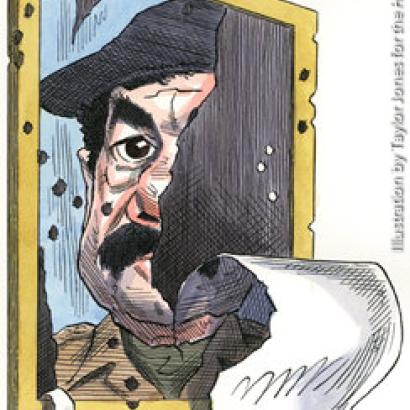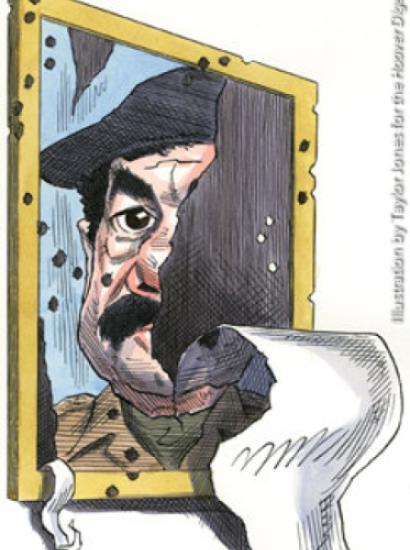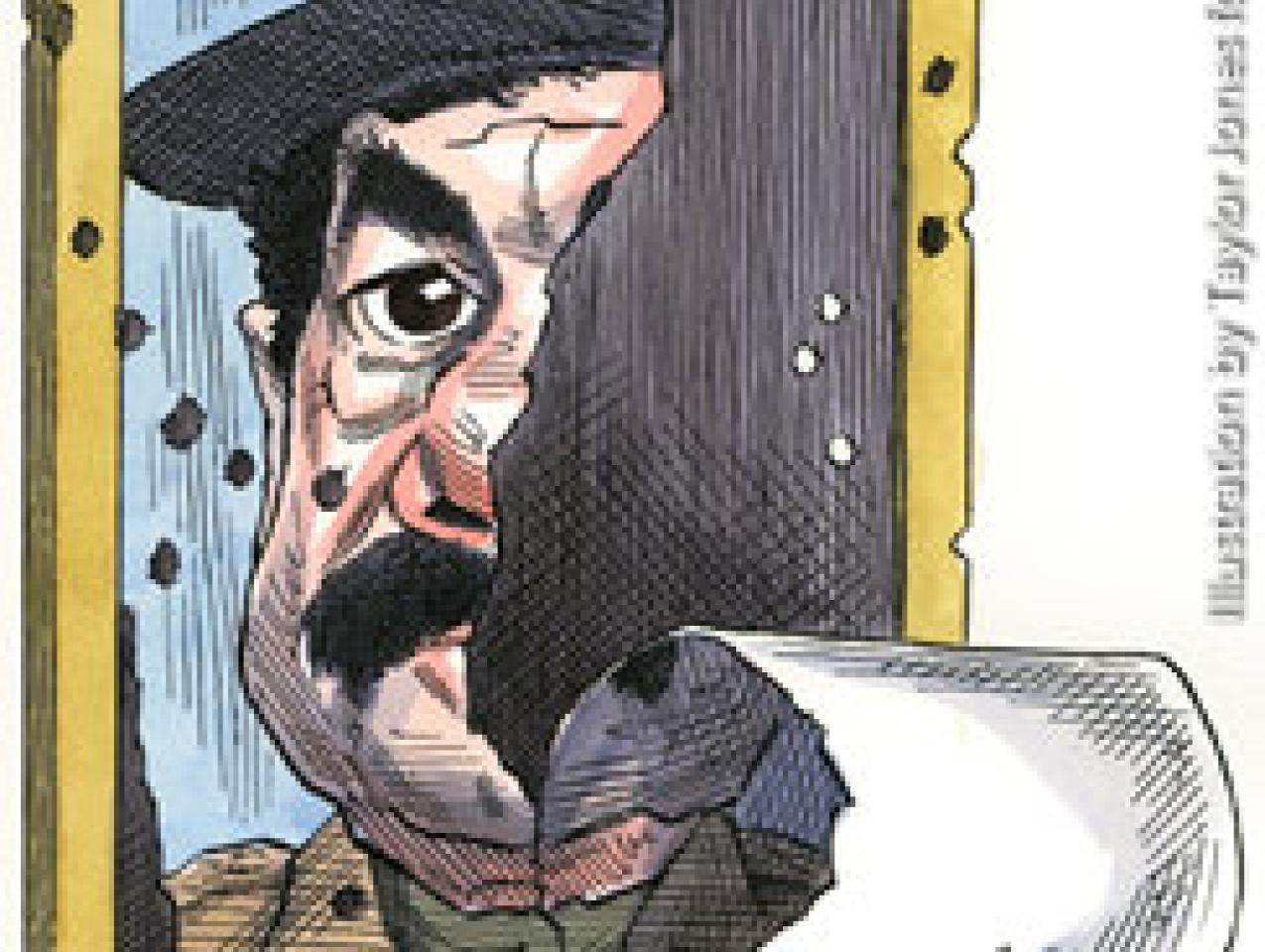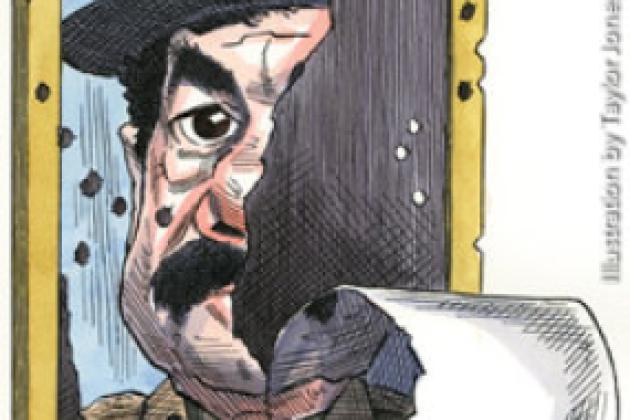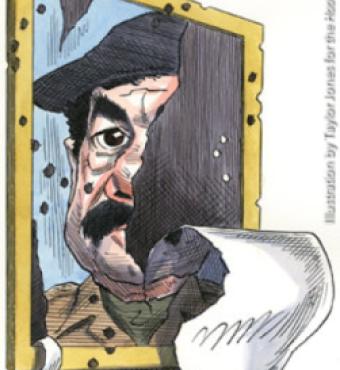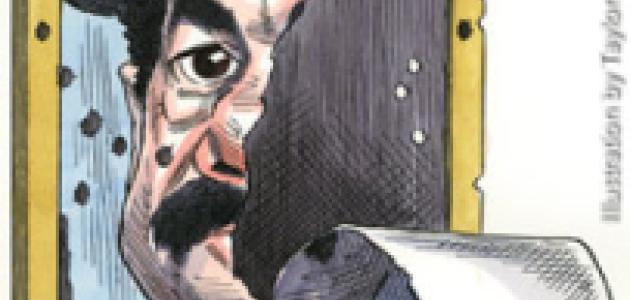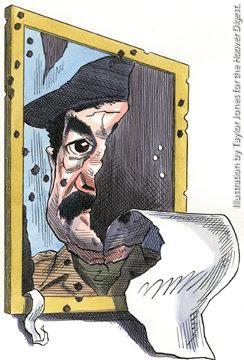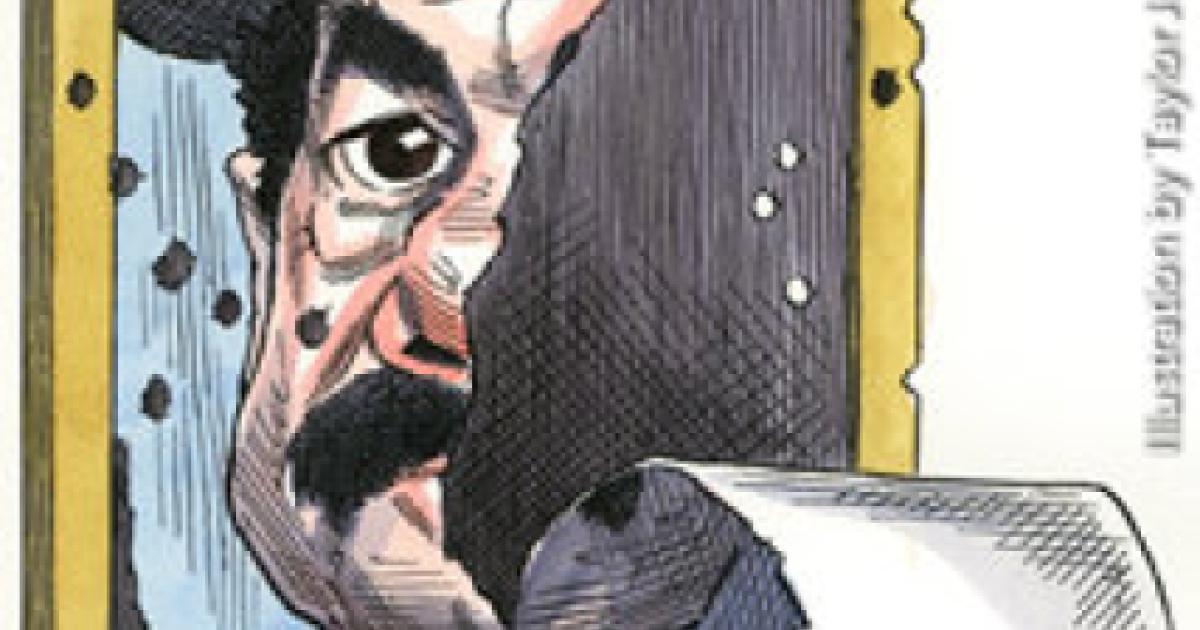- Security & Defense
- US Defense
- International Affairs
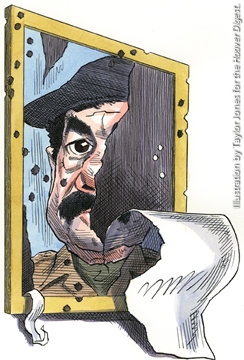
I n going to war to overthrow the dictatorship of Saddam Hussein, the United States has assumed an awesome responsibility for the post-war political and economic reconstruction of Iraq. Since the post-war reconstruction of Europe under the Marshall Plan, few political challenges have been more important to the long-term prestige and security of the United States—or more daunting. In launching war at this time without a United Nations mandate, and against the overwhelming sentiment of public opinion in most countries (including most democracies), the Bush administration has undertaken a momentous gamble. Now an administration that once scorned “nation-building” as no business of the United States must endeavor to rebuild one of the more fractious and brutalized countries on the planet.
Part of the moral justification for the war has been to “liberate” the Iraqi people from a ruthless and venal dictatorship. Implicit in this cause “liberation”—and explicit in the vows and rationales of strategists in and around the Bush administration—has been the conviction that Iraq can and must be assisted to build a completely new, democratic form of government. In its most extravagant expressions, the democratic transformation of Iraq is envisioned as a geopolitical earthquake that will shake Middle Eastern autocracies to their foundations and finally extend the global wave of democratization to the last major region to hold out against it.
It is possible—just possible—that Iraq could gradually develop into a democracy, but the task is huge and the odds are long against it. Only a frank recognition of the obstacles and dangers, and a sober reflection on the lessons of post-conflict reconstruction, can make a democratic transformation possible. It will require a prolonged and internationalized engagement with Iraq, costing billions of dollars over a number of years. We must not repeat the mistakes of our post-war engagement with Afghanistan, which has been ad hoc, haphazard, inadequately funded, tardy in reconstruction, and utterly unwilling to deploy and utilize the military force necessary to secure the new political order.
The Long Odds
Even in the immediate aftermath of the stunning fall of Baghdad, it is apparent that post-war Iraq will bear only limited resemblance to the crushed dictatorships of (divided) Germany and Japan or to the world that permitted total American occupation and transformation of those two countries after victory in World War II. Then the moral and political standing of the United States in the world was at its zenith, and the U.S. domination of each country was thorough. Then the challenge to our occupation came only from a rival foreign power. We had time, self-confidence, and international legitimacy.
In Iraq, we confront a much more perilous and complicated situation. As time goes on, Iraqis are likely to be torn between conflicting emotions: gratitude for their liberation from tyranny and nationalist resentment over their control by a foreign power, urgent need for economic assistance and profound resentment at years of international sanctions and economic ruin. Relief will mix with anxiety, hope with distrust of American intentions, expectation with bitterness at all the suffering and destruction. Iraqis will also be intensely divided among themselves, not only along the obvious cleavage lines of (Sunni) Kurds versus (Arab) Sunnis versus Shiites (versus a smattering of other small minorities) but along a bewildering and shifting welter of political, historical, clan, and family antagonisms. On top of all of this will come diffuse security threats of sabotage from diehard elements and terrorist infiltrators and demands for revenge against the former oppressors. No problem is more immediate, pervasive, or enduring than the problem of establishing and maintaining order.
Beyond this, the social, economic, and political conditions for establishing democracy in Iraq are far from favorable. Unlike Germany, Japan, and Italy, Iraq has no prior experience with multiparty democratic, or at least semi-democratic, government (with the important exception of the post-1991 experiment with democracy in the autonomous Kurdish areas in the north). In particular contrast to post–World War II Europe, Iraq sits in a region that is hostile to democracy and in a cultural zone—the Arab world—that does not have a single democracy (and, apart from Lebanon, has never had one). To be sure, Iraq does have impressive human capital: scientists, engineers, businesspeople, artists, and intellectuals, many of the best of whom stand ready to return from exile. But the circumstances are still forbidding. Illiteracy among adults is now estimated at more than 40 percent (not much better than Egypt). The Iraqi population is young (40 percent under age 15) and growing rapidly, while joblessness and economic displacement are pervasive and services are in shambles. These facts alone constitute the raw material of explosive frustration. The middle class has been destroyed by the folly and brutality of Saddam’s dictatorship and by the 12 years of international sanctions it brought on. The economy is a classic oil-dependent, rentier state, with 95 percent of foreign-exchange earnings coming from oil exports. Oil may generate the wealth to rebuild the country, but in developing countries, it also generates the pervasive corruption that undermines democracy, stability, and the rule of law. Nor are there any independent centers of power and thought in Saddam’s Iraq. Of course, there was no civil society to speak of in Japan or Germany when post-war occupation began, but, in contrast to Iraq, there were traditions to be recalled and resurrected. All of this augurs for a long, difficult, and costly reconstruction in both economic and political terms, with a population that is restive, embittered, fragmented, and hurting.
First Things First
There are three initial and urgent imperatives for the reconstruction of Iraq: humanitarian relief, economic reconstruction, and political order. The over-whelming initial priority is to get food to hungry people, to care for (and, as quickly as possible, resettle) refugees, to provide medical care to the sick and wounded, and to restore water and electricity to cities and towns where these, and other vital services, were severed in the war. In the coming weeks and months, the humanitarian needs will be extensive, if not massive, and they clearly will need urgent attention. Supplies must be distributed and services restored with an intense, comprehensive, and focused effort that draws on the broadest possible range of relief agencies, both U.S. and international, public and private. Generating favorable economic conditions will require a rapid effort toward post-war reconstruction, beginning (as nearly as possible) simultaneously with the inception of humanitarian relief. Reconstruction of physical infrastructure must get under way boldly and intensively.
Much will depend on the occupation authority establishing and maintaining order and preventing outbreaks of violence and looting. Even as formal Iraqi military resistance has collapsed, the country remains awash in small arms from a variety of sources, including Saddam’s military and security forces that have melted back into the population. These troops will need to be fully demobilized and their weapons collected—voluntarily or involuntarily. Would-be warlords and tribal militias will have to be contained and faced down. Criminals, saboteurs, and diehard regime loyalists must be detained and tried in a fair manner. A new Iraqi police force will need to be constructed, and fairly rapidly, because the occupying military forces cannot indefinitely police people with whom they cannot communicate and who are deeply distrustful of their purpose. A process will be needed to vet the existing ordinary Iraqi police force, some of which can—with intensive education, retraining, and reorganization, perhaps assisted by the United Nations—probably be integrated into a new force. The new Iraqi police and military could also be recruited from the ranks of Kurdish and Shiite resistance forces. In the immediate interim, however, American and British forces must be replaced on the streets of Iraqi cities and towns with a multinational force trained in post-conflict policing. Given the linguistic imperatives, such a force might include some officers lent for the purpose by Arab states sympathetic to the mission of Iraqi post-war reconstruction. As Ray Jennings observed in a recent report from the United States Institute of Peace, “Maintaining a multinational face to a policing and adjudicatory presence will go a long way to muting criticisms of imperial motivations.”
There will need to be an urgent and comprehensive effort at “de-Saddamization” and “de-Baathification,” that is, identifying and arresting senior figures responsible for the political crimes of Saddam’s regime, including leading figures of his Baath Party, and banning from post-war governance and politics the large number of people who played an active supporting role. Careful sifting through the secret police and personnel files of the Saddamist state will be vital to this vetting process. But at some point, the line must be drawn (probably in the thousands). To disqualify anyone who collaborated with the regime might blacklist a million people, hopelessly crippling reconstruction. If post-war Iraq is to get back on its feet quickly, most of the civil service that did not have active responsibility for Saddam’s reign of terror will need to be retained. And, once purged of true Saddam loyalists, a smaller and more professional Iraqi army will need to be handed back its dignity and purpose. Jennings recommends that Iraqi brigades be given incrementally greater responsibilities for maintaining order, containing “spoilers” (armed actors who disrupt the peace to aggrandize their power and resources), and assisting with aid delivery and emergency reconstruction, as they gradually demonstrate their commitment to a new Iraq.
In the near term, only a massive occupying force will be able to establish order and hold the country together. The U.S. Army chief of staff, General Eric Shinseki, estimated this would require some 200,000 soldiers, nearly as large an occupying force as the one that fought to overthrow the regime. It was not a good sign when the Bush administration appeared to chastise him for this honest appraisal before the war. Order cannot be restored and maintained on the cheap. (Neither will it be an easy or quick task, even in peacetime, to track down all of the possible hiding places for Saddam’s weapons of mass destruction.) One would hope that this peace-implementation force could be much broader in composition than the almost purely Anglo-American liberation force. Ideally, as New York Times columnist Thomas Friedman has suggested, the military occupation of Iraq should formally be a NATO operation or at least a very broad force drawing its core from our NATO partners. Even then, it will require a large number of American troops; one clear lesson from other post-conflict missions of the past decade is that such a force must have a unified command with robust authority to use decisive force to face down spoilers, warlords, and criminal thugs. Given its track record in previous post-conflict operations, this would seem to rule out handing over the military responsibilities to the United Nations.
Building an Accountable Government
One reason the challenge in post-war Iraq is so formidable is that our legitimacy is so fragile. The more hubristic of the war and post-war planners anticipated a uniformly jubilant reception for American soldiers by an Iraqi people grateful to be liberated from Saddam’s tyranny. Jubilation and gratitude, however, have been mixed with impatience, confusion, anger, grieving, and even nationalist loathing. Inside Iraq and throughout the Arab world, suspicion is rife of American colonial intentions. We will not have much time to get it right: to frame the post-war context in a way that clearly underscores ownership by the Iraqi people. This will be a delicate task because, initially, there will be no legitimate representatives of the Iraqi people to hand authority over to; if we simply designate a few Iraqis out of thin air, they could quickly be rejected as stooges of the United States.
Very soon after the initial pacification of the country and the onset of humanitarian relief and economic reconstruction, the task of political reconstruction must begin. This means initiating a process for constituting a wholly new and legitimate Iraqi government. Inevitably, this task will have to unfold in stages over an extended period of time. The first phase must be to assemble an interim government that will exercise political authority alongside the international military occupation force, which will lead the process of designing a permanent constitutional system. Supervising political reconstruction must not be the responsibility of a U.S. military governor (even in the form of a retired general), who would not have the credibility or legitimacy for the task. It must have a different international face, perhaps in the form of a United Nations administrator, and it must quickly empower Iraqis.
The process of constructing an interim government must be broadly consultative, drawing together a representative assembly of Iraqis from all major regions and ethnic and religious groups and from both within the country and from exile. In the Washington Quarterly’s current (spring) issue, Frederick D. Barton and Baathsheba Crocker propose that a U.N. coordinator “begin planning for a series of municipal- and provincial-level meetings that would lead to a graduated selection of national dialogue delegates.” Such an assembly or “dialogue” could then either choose or advise the international administration on the selection of a broadly inclusive transitional government.
Writing in the Financial Times last October, Laith Kubba, a founding member of the (opposition in exile) Iraqi National Congress and senior program officer for the Middle East at the National Endowment for Democracy in Washington, D.C, proposed an interim administration of four temporary councils. The first would be a transitional lower house with 200 members appointed or elected by various identifiable political groups, with three-quarters of the seats going to opposition formations in exile and in (autonomous) northern Iraq. The second body “would be a sort of senate, with 100 seats mainly for tribal, religious, and ethnic dignitaries.” This council (including Turkmen, Assyrian, Christian, and other minorities) “would give traditional leaders a role without requiring them to politicize their communal identities.” These two bodies would then nominate members of a constitutional assembly, set a broad agenda for it, and then approve the draft constitution it produces before sending the document to a vote of the Iraqi people by referendum. Kubba proposes that the fourth council—made up of selected officers from the current Iraqi military and from the two Kurdish and one Shiite opposition forces—supervise security matters, such as securing the borders, stopping violent conflicts, and asserting control over loose weapons and armed men. My own view is that ultimate authority for these matters would have to rest with the occupation force, but the sooner responsibility could be shared with a new and integrated Iraqi security council, the more effectively these functions could be performed. Finally, Kubba calls for a collective interim presidency—with one senior member each from the north, center, and south of Iraq—to exercise overall political authority—appointing interim cabinet ministers, approving nominations of additional members to the other councils, and ensuring “the legitimacy of the procedures of the constitutional assembly.”
As Kubba recognizes, this plan is far from perfect, but it has several compelling virtues. It would be inclusive and representative, although initially at least not democratically so, as there would be no way to hold meaningful democratic elections in the immediate vacuum of post-war Iraq. In accommodating many groups, it would give each of them a stake in the process, muting incentives to attack or undermine it. By making existing armed groups (the regular military and the Kurdish and Shiite opposition forces) part of the process, it would go a long way toward preempting one of the most intractable problems in post-conflict situations: violent spoilers who resolve to get a better deal by force and intimidation. And most important for the United States, it would create a legitimate new Iraqi government that the United States could engage and to which the occupying force could devolve substantial authority in all realms. Only with the rapid construction of such an interim government can the necessarily prolonged international occupation remain politically viable.
There appears to be a very broad consensus among Iraqi democrats for substantial devolution of power and resources away from Baghdad, toward the provinces. As the esteemed Iraqi thinker Kanan Makiya has recently argued, “No future state in Iraq can be democratic if it is not at the same time federal in structure.” Writing again in the Financial Times in December, Laith Kubba proposed that the new Iraqi constitution “give each province the right to rule itself with a full panoply of local powers and institutions such as the power to borrow and collect taxes, to regulate trade within provincial borders, to have provincial courts and legal codes, to elect a provincial legislature and governor, and so on.” All this would be financed by a proportional distribution of Iraq’s oil (and other) revenue to each province, according to its population and resources. The national government, with decidedly limited powers, should in his view be parliamentary, with a ceremonial president and a bicameral parliament whose upper house (as in the United States) would consist of an equal number of members from each province.
To be sure, this is only one very sketchy framework. Significant power would have to be retained by the center, along with strong constitutional provisions against secession, if this formula were to be acceptable to Turkey (which fears that Kurdish secession from Iraq would reignite secessionist mobilization of its own Kurdish minority) and other neighboring states. The United States and other powerful international actors would have to make clear that they would not recognize or support any attempt at secession by a province or group of provinces in Iraq. Although Kubba proposes an Anglo-American-style, first-past-the-post electoral system in single-member districts, Iraq might benefit instead from proportional representation in small-sized districts (not a national list, which reifies the major regional divisions) or from an Australian-style alternative vote (requiring voters to rank parties and candidates preferentially). Either of these options could induce the formation of broad, multiethnic parties that would have incentives to campaign nationwide and thus slowly transcend the current religious and ethnic divisions in the country.
All this would have to be protected and guaranteed by a strong and autonomous court system, led by an independent constitutional court; by strong constitutional guarantees for individual and minority rights; and by an array of other independent agencies of accountability and restraint: an audit agency, a human rights commission, an ombudsman’s office, a counter-corruption commission, an electoral commission, and a central bank. It is vital that these restraining agencies, led by people of integrity, ability, and experience, be inaugurated early in the process of political reconstruction, with substantial international training and institutional assistance. Given Iraq’s history and political culture—not to mention its economic dependence on oil income controlled by the central state—corruption and abuse of power will be two of the most stubborn and pervasive threats to the new political order. If tyranny is to be prevented from emerging once again in Iraq, political power will have to be divided from the very start both vertically and horizontally.
To reshape the political culture, as much as to maintain political order, the rule of law will need to be an urgent priority (much more urgent than formal elections). The entire legal code of the country will need to be reviewed, reformed, and publicly conveyed. Barton and Crocker recommend that a U.N. transitional administrator assemble “a team of Iraqi expatriate and international lawyers to vet Iraq’s existing laws and constitution for consistency with international human rights laws” and to adopt an interim legal code. This would have to be accompanied by energetic deployment of international (and whenever possible, Arab) legal experts, judges, prosecutors, defense attorneys, and educators to train and construct a new Iraqi legal system and to enlist Iraqis in the vital task of public education on human rights and the rule of law. Transparency and openness will be vital throughout if a culture of legality and democracy is to be fostered. For this reason, early emphasis must also be placed on training and supporting a new generation of professional Iraqi journalists and broadcasters.
It will take years to build a viable democracy in Iraq. Assembling a transitional government along the lines proposed by Kubba should be considered an urgent task, but the implementation of democratic elections should be done gradually, beginning at the local and then provincial levels. This would generate a breathing space for the country to get back on its feet economically and socially, for legitimate government to begin to take hold, for the worst offenders of Saddam’s regime to be tried and punished for their crimes against humanity, for other major Baath Party and repressive state officials to be identified and perhaps banned for life from holding public office, for the wealth that they have stolen and sequestered abroad to be identified and returned to Iraq, and for a truth commission of democratic Iraqis to begin to investigate and report the full horror of degradation, brutality, and criminality under Saddam’s quarter-century of rule. It would also allow time for independent mass media, interest groups, and other civil society organizations to emerge and for a new generation of democratic political parties to take shape, to govern at local levels of responsibility, to accumulate records of performance, and thus to build up or squander bases of support. It would then be several years before a national government was elected and able to assume full responsibility for governing a new Iraq.
The Need for Humility and Persistence
Rebuilding Iraq into a responsible and lawful state will be the most financially costly and politically formidable task the United States has assumed internationally in decades. It is both an awesome challenge and, in Makiya’s words, “a historic opportunity . . . as large as anything that has happened in the Middle East since the fall of the Ottoman Empire and the entry of British troops into Iraq in 1917.” We have very little margin for error. If we do not act quickly to relieve the suffering of the Iraq people, to establish order on the ground, and to generate a legitimate transitional government that clearly conveys Iraqis’ ownership over their own future, we will face mounting protest and resistance that could undermine the entire post-war project and nullify a huge investment of blood and treasure. If we do not allow the Iraqi people to design and choose their own government—knowing full well that democracy in Iraq, as in Turkey, will make decisions that will not please us—we will squander a historic opportunity for regional transformation. If we do not stay the course through to a rebuilt nation—a task that may take the better part of a decade—early successes may later unravel. If we fail in post-war Iraq, all the opponents of American intervention will claim vindication, and our credibility and standing in the world will be gravely damaged, along with our national security.
The successful reconstruction of Iraq will require intelligence, generosity, flexibility, resolve—and a very large dose of humility. In the coming months, we must constantly bear in mind that democracy is not a gift we as Americans can bestow on Iraqis—or any other people. It is an opportunity that each people must discover, grasp, and craft for themselves. All we can do is to help them establish a new national context of legality and order, of consultation and mutual respect and trust, in which such a new political and economic future can be crafted. And even that we can only do effectively in collaboration with many other international partners and institutions.
If we yield to the imperial temptation implicit in the triumphalist, unilateralist visions of what America’s role should be in the post–September 11 world, we will reap a bitter harvest, what Rudyard Kipling warned of in his famous poem:
Take up the White Man’s burden—
And reap his old reward,
The blame of those ye better,
The hate of those ye guard. . . .
If we are not to meet the fate of previous empires, we must behave in Iraq as modest stewards, giving much and asking in the near term little in return, save that the Iraqi people use this opportunity to construct for themselves a decent, accountable, law-abiding, fair—and hopefully democratic—government.








